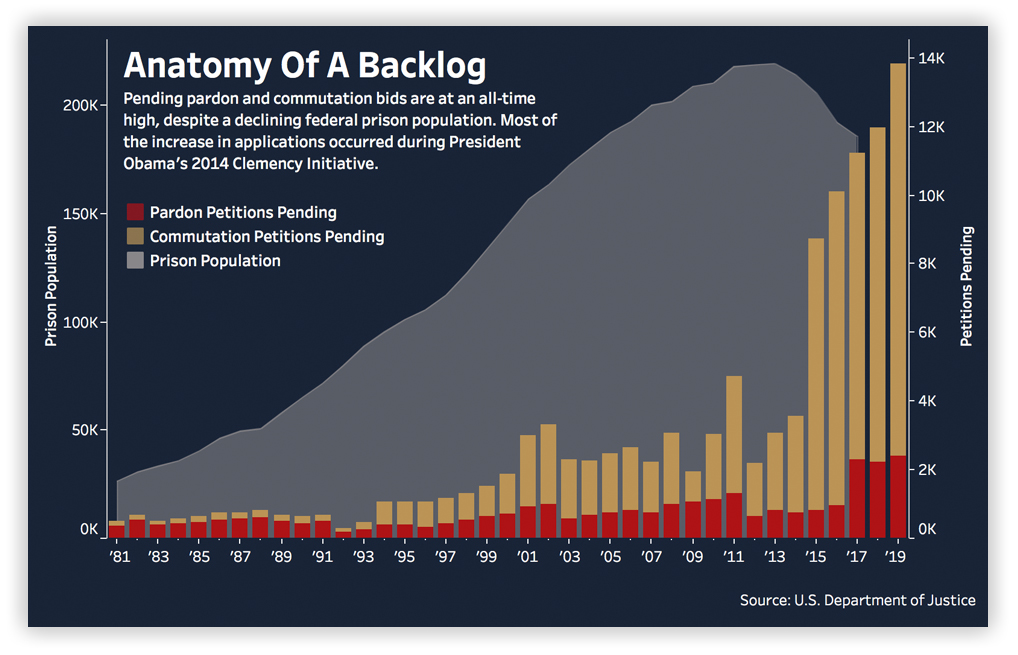We post news and comment on federal criminal justice issues, focused primarily on trial and post-conviction matters, legislative initiatives, and sentencing issues.

FSA-ELIGIBLE INMATES HAVE REASON TO BE THANKFUL (EVEN WHILE REMAINING A BIT CONFUSED)
Responding to mounting criticism about the Bureau of Prisons’ messy implementation of the First Step Act’s earned-time credits (ETCs), the BOP last week finally rolled out a program statement articulating its ETC policies.
 For those just tuning in, the First Step Act – passed in December 2018 – established a program in which federal inmates could earn credits for successfully completing programs that were designed to reduce recidivism or participating in “productive activities” that are linked to resulting in less recidivism. Those credits (called “FSA credits” [First Step Act credits]) or “FTCs” [“Federal Time Credits) or “ETCs”) could be used by prisoners to reduce their sentences by up to 12 months or earn more time in halfway houses or home confinement. Although disrupted by the COVID pandemic and chronic staffing shortages, the BOP has been implementing the ETC program in fits and starts.
For those just tuning in, the First Step Act – passed in December 2018 – established a program in which federal inmates could earn credits for successfully completing programs that were designed to reduce recidivism or participating in “productive activities” that are linked to resulting in less recidivism. Those credits (called “FSA credits” [First Step Act credits]) or “FTCs” [“Federal Time Credits) or “ETCs”) could be used by prisoners to reduce their sentences by up to 12 months or earn more time in halfway houses or home confinement. Although disrupted by the COVID pandemic and chronic staffing shortages, the BOP has been implementing the ETC program in fits and starts.
The latest snafu came in the implementation of a computer system to automatically calculate each prisoner’s ETCs (“Auto-Calc”). The system – planned for August 1 but actually launched the last week of September – automatically rescinded a lot of ETCs already granted, mostly because inmates had not completed online “needs assessment” surveys a year or more before, “surveys” that neither they nor the staff knew were mandatory in order to earn ETCs.
 Earlier last week, Senators Richard Durbin (D-IL), chairman of the Senate Judiciary Committee, and Senator Charles Grassley (R-IA), ranking Republican on the Committee, jointly wrote to Attorney General Merrick Garland criticizing the BOP for (1) Auto-Calc’s having rescinded previously-awarded ETCs for some prisoners; (2) setting an arbitrary rule that the BOP would stop applying ETCs to the up-to-12 months’ sentence reduction when inmates are 18 months from the door; (3) not granting ETCs to people in halfway house and home confinement; and (4) failing to clean up the PATTERN risk assessment tool to address “unjustified disparities that have arisen.”
Earlier last week, Senators Richard Durbin (D-IL), chairman of the Senate Judiciary Committee, and Senator Charles Grassley (R-IA), ranking Republican on the Committee, jointly wrote to Attorney General Merrick Garland criticizing the BOP for (1) Auto-Calc’s having rescinded previously-awarded ETCs for some prisoners; (2) setting an arbitrary rule that the BOP would stop applying ETCs to the up-to-12 months’ sentence reduction when inmates are 18 months from the door; (3) not granting ETCs to people in halfway house and home confinement; and (4) failing to clean up the PATTERN risk assessment tool to address “unjustified disparities that have arisen.”
The BOP responded to Durbin and Grassley with alacrity (a sentence I never thought I’d write). As noted, when Auto-Calc came online, many prisoners who had seen their release dates move up due to award of ETCs months before suddenly lost some or all of their time because they had not completed online needs assessment surveys in 2020 and 2021. Of course, the BOP never told inmates that completion was mandatory if inmates wanted to earn credits. The BOP itself admitted that nearly half of staff interviewed for a March report indicated no familiarity with, or declined comment on, the needs assessment process and FSA incentives policies,” according to Forbes magazine.
In a press release issued Friday, the BOP said, “With the automation, some inmates noticed their time credit balance decreased due to incomplete needs assessments and/or declined programs. This policy includes a grace period, available until December 31, 2022, for inmates who have not completed all needs assessments or who have declined programs to try to address these issues. Beginning January 1, 2023, any incomplete needs assessments or any declined to participate codes will lead to the inmate not earning FTCs in accordance with the federal regulations.”
 So people in federal custody now have until New Year’s Eve to figure out what needs assessments they “failed” to complete and to get them done.
So people in federal custody now have until New Year’s Eve to figure out what needs assessments they “failed” to complete and to get them done.
The “grace period” policy is not written into the new Program Statement, suggesting that it is an 11th-hour change. Its absence from the Program Statement is a little worrisome: no one relishes going to court to enforce the terms of a press release.
Although the Program Statement doesn’t say anything about “grace” as such, it does contains a lot:
• Every eligible prisoner with a low or minimum PATTERN score will receive a conditional projected release date based on the maximum number of ETCs he or she can earn during the sentence.
• Prisoners remain eligible for ETCs even those locked up in the Special Housing Unit, unless they are in disciplinary segregation.
• Productive activities have been defined in greater detail. Besides the “structured, curriculum-based group programs and classes” already defined in the First Act Approved Programs Guide, the new Program Statement provides examples such as “recreation, hobby crafts, or religious services,” visitation, ACE classes, institution work programs, community service projects, and even participation in an FRP plan.
The Program Statement provides little clue as to who determines which unstructured activities will count as “productive activities.” It only says, “Additional groups, programs, classes, or unstructured activities may be recommended to assist the inmate in establishing positive institutional adjustment and involvement in pro-social activities. The inmate’s risk level, needs assessment results, and program recommendations will be documented on the inmate’s Insight Individualized Need Plan, and the inmate will receive a copy.”
That suggests the BOP line employees will determine what unstructured programs will count, but it does not explicitly say that. The omission provides an excellent opening for confusion and unwarranted denial of ETC credit as managers at 122 separate BOP facilities define what is a productive activity in 122 different ways.
• The Program Statement says “inmates with unresolved pending charges and/or detainers may earn FTCs, if otherwise eligible, but “they will be unable to apply them” to sentence reduction or halfway house/home confinement “unless the charges and/or detainers are resolved. An inmate with an unresolved immigration status will be treated as if he/she has unresolved pending charges with regard to the application of FTCs.”
So good news here: The BOP has consistently been defining inmates with detainers as being ineligible to even earn ETCs. Now, detainers will no longer prevent people from earning ETCs. But for some reason, the BOP continues to refuse to use ETCs for sentence reduction when people have detainers.
• The Program Statement makes it clear that inmates with medium/high PATTERN scores may earn ETCs, but that they cannot use them unless they work their way down to low or minimum risk assessment status.
What the Program Statement does not mention is how people in halfway houses or on home confinement can earn ETCs, despite the fact the First Step Act and the BOP’s own final rules contemplate it. In fact, reference to “community service projects” and “religious services” as unstructured activities seems to be perfectly suited for people on prerelease custody.
In the Merrick Garland letter, Senators Durbin and Grassley complained that the BOP has no mechanism to allow people on prerelease custody to earn ETCs.
 Also unmentioned in the Program Statement is the BOP’s “18-month rule” that inmates with 18 months or less remaining on their sentences may not apply ETCs towards reducing their sentences. Senators Durbin and Grassley complained in their letter that the 18-month rule “is not supported by the FSA, nor does it further the FSA’s goal of incentivizing recidivism reduction programming for returning persons. Moreover, under this guidance, any federal prisoner with a sentence of 18 months or less would be unable to earn an earlier release date. BOP should therefore not implement an arbitrary cutoff on earning ETCs toward release.”
Also unmentioned in the Program Statement is the BOP’s “18-month rule” that inmates with 18 months or less remaining on their sentences may not apply ETCs towards reducing their sentences. Senators Durbin and Grassley complained in their letter that the 18-month rule “is not supported by the FSA, nor does it further the FSA’s goal of incentivizing recidivism reduction programming for returning persons. Moreover, under this guidance, any federal prisoner with a sentence of 18 months or less would be unable to earn an earlier release date. BOP should therefore not implement an arbitrary cutoff on earning ETCs toward release.”
U.S. District Judge Lorna G. Schofield granted habeas corpus last week to a prisoner who complained that the BOP had arbitrarily refused to apply any of his ETCs earned after January 2022 to a shortened sentence. The BOP explained that it was not applying any ETCs to a reduced sentence once the inmate was within 18 months of release.
Judge Schofield ordered the BOP to apply the prisoner’s ETCs to a shortened sentence up to the 365-day limit. She ruled,
Letter to Attorney General (November 16, 2022)
Forbes, U.S. Senators Express Concern With Bureau Of Prisons’ Implementation of First Step Act (November 17, 2022)
BOP, P.S. 5410.10, First Step Act of 2018 – Time Credits: Procedures for Implementation of 18 U.S.C. § 3632(d)(4) (November 17, 2022)
BOP, First Act Approved Programs Guide (August 2022)
Brodie v. Warden Pliler, 2022 U.S.Dist. LEXIS 202749 (S.D.N.Y., Nov 7, 2022)
– Thomas L. Root


 Eighty-three days after his judge denied his 28 U.S.C. § 2255 motion, Joe Reho filed something with the district court. It may have been a motion for an extension of time to apply for a certificate of appealability. It may have been a notice of appeal. No one was quite sure what it was, but everyone was quite sure it was written without the benefit of a dictionary nearby.
Eighty-three days after his judge denied his 28 U.S.C. § 2255 motion, Joe Reho filed something with the district court. It may have been a motion for an extension of time to apply for a certificate of appealability. It may have been a notice of appeal. No one was quite sure what it was, but everyone was quite sure it was written without the benefit of a dictionary nearby. Under Rule 4(b)(4) of the Federal Rules of Appellate Procedure, district court may extend the time to file a notice of appeal based on “excusable neglect or good cause” if an extension is filed within 30 days after the notice of appeal due date. Here, Circuit said, construing Joe’s “filing liberally, we conclude that he moved for an extension of time to file a notice of appeal. While the district court docketed the document as a notice of appeal, Joe’s motion requested, in the opening paragraph, ‘a extention of time to filed a certificate of Appealability… and to proceed inform a peuperis on appeal.”
Under Rule 4(b)(4) of the Federal Rules of Appellate Procedure, district court may extend the time to file a notice of appeal based on “excusable neglect or good cause” if an extension is filed within 30 days after the notice of appeal due date. Here, Circuit said, construing Joe’s “filing liberally, we conclude that he moved for an extension of time to file a notice of appeal. While the district court docketed the document as a notice of appeal, Joe’s motion requested, in the opening paragraph, ‘a extention of time to filed a certificate of Appealability… and to proceed inform a peuperis on appeal.” “This court construes pro se habeas petitions liberally,” the 6th held, apparently even where spelling and grammar are butchered. “For instance, we regularly construe notices of appeal as applications for a certificate of appealability… We have also construed motions for extension of time as notices of appeal… Repo’s motion appears to ask for an extension to apply for a certificate of appealability rather than for an extension to file a notice of appeal. But his motion is a far cry from the simple notices of appeal that we have refused to construe as motions for extension… Repo’s motion reads as a motion for extension of time to file a notice of appeal and will be treated as such.”
“This court construes pro se habeas petitions liberally,” the 6th held, apparently even where spelling and grammar are butchered. “For instance, we regularly construe notices of appeal as applications for a certificate of appealability… We have also construed motions for extension of time as notices of appeal… Repo’s motion appears to ask for an extension to apply for a certificate of appealability rather than for an extension to file a notice of appeal. But his motion is a far cry from the simple notices of appeal that we have refused to construe as motions for extension… Repo’s motion reads as a motion for extension of time to file a notice of appeal and will be treated as such.”























